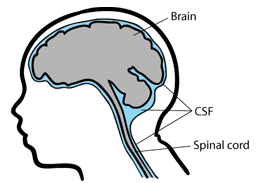Meningitis is an illness in which there is inflammation of the tissues that cover the brain and spinal cord. Viral or "aseptic" meningitis, which is the most common type, is caused by an infection with one of several types of viruses. Meningitis can also be caused by infections with several types of bacteria or fungi. Knowing whether meningitis is caused by a virus or a bacterium is important because the severity of illness and the treatment differ.
Viral meningitis is generally less severe and resolves without specific treatment, while bacterial meningitis can be quite severe and might result in brain damage, hearing loss, or learning disability.
For bacterial meningitis, it is also important to know which type of bacteria is causing the meningitis because antibiotics can prevent some types from spreading and infecting other people. Before the 1990s, Haemophilus influenzae type b (Hib) was the leading cause of bacterial meningitis, but new vaccines being given to all children as part of their routine immunizations have reduced the occurrence of invasive disease due to H. influenzae. Today, Streptococcus pneumoniae and Neisseria meningitidis are the leading causes of bacterial meningitis.
Signs and Symptoms of Meningitis
High fever, headache, and stiff neck are common symptoms of meningitis in anyone over the age of 2 years. These symptoms can develop over several hours, or they might take 1 to 2 days. Other symptoms may include nausea, vomiting, discomfort looking into bright lights, confusion, and sleepiness. In newborns and small infants, the classic symptoms of fever, headache, and neck stiffness may be absent or difficult to detect, and the infant may only appear slow or inactive, or be irritable, have vomiting, or be feeding poorly. As the disease progresses, patients of any age may have seizures.
Treatment
Bacterial meningitis can be treated with a number of effective antibiotics. It is important, however, that treatment be started early in the course of the disease. Appropriate antibiotic treatment of most common types of bacterial meningitis should reduce the risk of dying from meningitis to below 15%, although the risk is higher among the elderly.
Transmission of Meningitis
Some forms of bacterial meningitis are contagious. The bacteria are spread through the exchange of respiratory and throat secretions (i.e., by coughing or kissing). Fortunately, none of the bacteria that cause meningitis are as contagious as things like the common cold or the flu, and they are not spread by casual contact or by simply breathing the air where a person with meningitis has been.
However, sometimes the bacteria that cause meningitis have spread to other people who have had close or prolonged contact with a patient with meningitis caused by Neisseria meningitidis (also called meningococcal meningitis) or Hib. People in the same household or daycare centre, or anyone with direct contact with a patient’s oral secretions (such as a boyfriend or girlfriend) would be considered at increased risk of acquiring the infection. People who qualify as close contacts of a person with meningitis caused by N. meningitidis should receive antibiotics to prevent them from getting the disease. Antibiotics for contacts of a person with Hib meningitis disease are no longer recommended if all contacts 4 years of age or younger are fully vaccinated against Hib disease.
Prevention
Different vaccines can protect us against the primary causes of meningitis. They are not all the same. Some protect against a broader spectrum of bacteria than others. A healthy immune system protects us well from most causes. Often we carry some of the germs that cause meningitis with no ill effects. People whose immune systems are compromised because of HIV, cancer treatment, organ transplant, infection or other causes are more susceptible. Seeking medical attention as soon as the symptoms appear is vital. Parents should particularly be aware of the symptoms in infants and young children because they often appear mildly but can quickly and alarmingly escalate. Meningitis strikes more often in cold weather so it is important to be even more careful in the winter.
For more information visit the Meningitis Research Foundation of Canada.





Comments